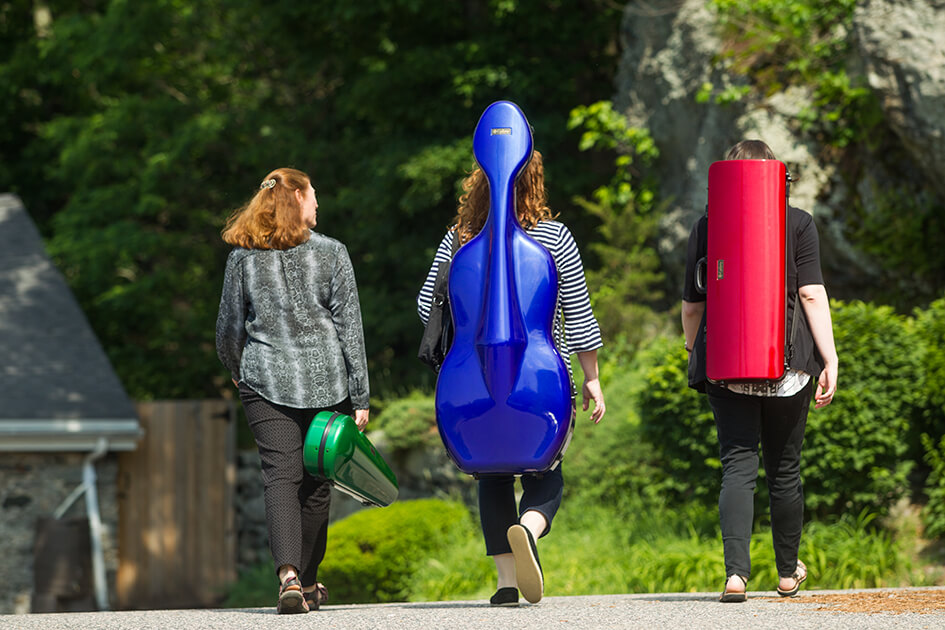You know those times when you do an extra good job on something, even when you understand that no one will appreciate or even notice it? And you don’t mind, really, because you’re putting in the extra effort for the sake of the work itself, not for earthly praise? Right. Well, at my house, we call these “none but the angels” moments. As in, “None but the angels will ever witness what I did.” Today, I would like to give some grateful public praise to people who put in a lot of none-but-the-angels labor: musicians.
Earlier this week I attended a wonderful concert by a group called Apollo’s Fire. They perform music from the early baroque period, which sounds like a recipe for somnolence, but I tell you: they stage a thrilling show. Their director is a graceful wisp of a woman, Jeannette Sorrell, a brilliantly creative musician and arranger and a slyly persuasive advocate for early music. Who knew that Spanish and Italian folk music from the seventeenth century could expose the hidden origins of tap dancing, fiddle playing, and sultry rock ballads? Plus: bagpipes!
Granted, Apollo’s Fire is a group of professional musicians—they’re based in Cleveland and travel internationally. Actually, they are not really the point here. The point is that I live in a community where I can drive fifteen minutes and enjoy a concert like this in a gorgeous, historic auditorium on a Thursday night. How is this possible? Because of all the behind-the-scenes people who create an extraordinarily rich musical life in my ordinary, medium-sized, Midwestern town.
Let’s take a little inventory of these good souls:
- The ladies who founded the St. Cecilia Society in 1883 in order to bring concerts to town, promote music education, and eventually establish a beautiful hall. Many other people over the years who worked on committees and raised money to form music organizations and build facilities.
- People who support and run the music organizations today, including our magnificent professional orchestra, the Grand Rapids Symphony, alive and kicking when so many regional orchestras have folded.
- Members of the symphony, many of whom have played in the orchestra for twenty, thirty, even forty years, and who promote music through teaching and performing, and who have to fight like the dickens every few years to negotiate exceedingly modest contracts.
- Private teachers—my children have been amazingly blessed by dedicated, truly gifted, patient and enthusiastic teachers.
- School and college music educators, who put up day to day with a lot of bad playing, but who nevertheless commit extra hours to concerts, solo & ensemble events, camps, and conventions that afford young musicians extra opportunities.
- The conductor of the area youth symphony, who unlike a lot of good conductors, actually finds teenagers amusing and worth his time. What he achieves with a hundred teenagers on Monday evenings will promptly silence anyone’s cynical critique of “kids these days.”
- This same conductor’s wife, who accompanies many of these young musicians at all kinds of contests and performances. Just last week, she spent a looooong evening at a competition, playing a passel of gnarly concerto accompaniments for numerous students, including my son. I saw her in the grocery store the next day, and she looked a wee bit tired.
- The conductor of the adult community orchestra that affords aging has-beens like me the chance to play exciting music and keep up our chops a little. Even if we don’t always play very well, we play with joy.
- All the volunteers who do the boring envelope-stuffing that keeps these organizations going.
- And let’s not forget church musicians. Few parishioners appreciate what these people do to find music, prepare it, rehearse, chase down details, and make a service happen. They work long hours on Sundays and put up with complaints from all directions, since no church musician can please everybody.
- And I haven’t even touched on the vocal/choir/opera people in this town, the keyboard people, the jazz musicians, the dancers, the artists, or the theater people.
All this to say, I live a rich life and I have a host of underappreciated people to thank for it. True: many of them are paid for what they do, a little. Not nearly what they deserve. Mostly they do it for the sake of the work, for joy, for love. None but the angels.
A final note: I don’t mean to ignore the people who give large sums of money to the arts. Some of them get recognized by having their names carved on concert halls or their business’s name in the program. But I’m sure many of them have to fight to support the arts with their company’s or foundation’s money and they’re not appreciated either. So in my quest to thank the unseen, I thank you, too.
So to all of you who labor behind the scenes simply for the sake of what is noble, lovely, beautiful, and admirable: may you be blessed!






One Response
Hear hear, and brava. It's true, how rich the musical life of Grand Rapids is, and how available, and that could not be so except for all those good souls.